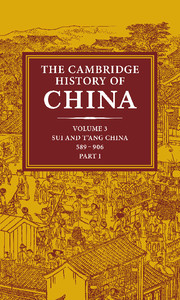Book contents
- Frontmatter
- 1 Introduction
- 2 The Sui dynasty (581–617)
- 3 The founding of the T'ang dynasty: Kao-tsu (reign 618–26)
- 4 T'ai-tsung (reign 626–49) the consolidator
- 5 Kao-tsung (reign 649–83) and the empress Wu: the inheritor and the usurper
- 6 The reigns of the empress Wu, Chung-tsung and Jui-tsung (684–712)
- 7 Hsüan-tsung (reign 712–56)
- 8 Court and province in mid- and late T'ang
- 9 Court politics in late T'ang times
- 10 The end of the T'ang
- Glossary Index
- References
3 - The founding of the T'ang dynasty: Kao-tsu (reign 618–26)
Published online by Cambridge University Press: 28 March 2008
- Frontmatter
- 1 Introduction
- 2 The Sui dynasty (581–617)
- 3 The founding of the T'ang dynasty: Kao-tsu (reign 618–26)
- 4 T'ai-tsung (reign 626–49) the consolidator
- 5 Kao-tsung (reign 649–83) and the empress Wu: the inheritor and the usurper
- 6 The reigns of the empress Wu, Chung-tsung and Jui-tsung (684–712)
- 7 Hsüan-tsung (reign 712–56)
- 8 Court and province in mid- and late T'ang
- 9 Court politics in late T'ang times
- 10 The end of the T'ang
- Glossary Index
- References
Summary
In 617 Li Yüan (566–635), the Duke of T'ang and one of the most powerful Sui generals, joined the scores of rebels who had arisen in the waning years of the Sui dynasty. His armies marched on the Sui capital, overwhelmed its defences, and took the city. There, six months later, he founded a new dynasty which was to endure for almost three centuries, and would rank alongside the Han as one of China's two golden ages of empire. As Li Yüan went on to impose firm central authority throughout the country, he was fortunate in being the heir to the great achievements of the Sui, who, barely three decades before, had brought centuries of disunion to an end. The institutions of his new dynasty were established on the solid foundations left by his predecessors.
Like the majority of rebel leaders throughout Chinese history who succeeded in founding dynasties of their own, Li Yüan was not a commoner but a nobleman of distinguished lineage. His ancestry can be traced with certainty as far as his grandfather, Li Hu, one of the ‘Eight Pillars of State’ (Pa Kuo-chu), the chief commanders associated with Yü-wen T'ai in the foundation of the Northern Chou state in the 550s. At that time the Li clan was centred on Wu-ch'uan chen, a garrison established by the Toba state of Northern Wei inside the Great Wall near modern Tat'ung, which was also the home of Yü-wen T'ai.
- Type
- Chapter
- Information
- The Cambridge History of China , pp. 150 - 187Publisher: Cambridge University PressPrint publication year: 1979
References
- 4
- Cited by

